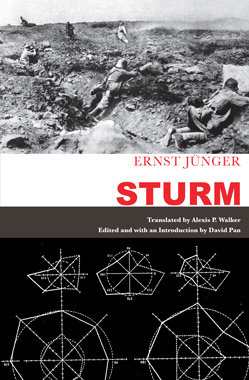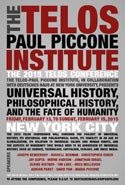“The vastness and deadly desolation of the field, the long-distance operation of steel machines, and the relay of every movement in the night drew an unyielding Titan’s mask over the proceedings. You moved toward death without seeing it; you were hit without knowing where the shot came from. Long since had the precision shooting of the trained marksman, the direct fire of guns, and with it the charm of the duel, given way to the concentrated fire of mechanized weapons. The outcome was a game of numbers: Whoever could cover a certain number of square meters with the greater mass of artillery fire, won.”
—Ernst Jünger, Sturm, describing the Battle of the Somme, whose centenary is this year.
|
“When a man fell, the others stood together over his corpse; their gazes met, dark and deep. But when death stood over the trenches like a storm cloud, then it was every man for himself: he stood alone in the darkness, howling and crashing surrounding him, blinded by sudden flashes, with nothing in his breast but endless desolation.” —Ernst Jünger, Sturm, describing the soldiers awaiting attack during the Battle of the Somme, whose centenary is this year. At the Great War Fiction blog, George Simmers reviews Ernst Jünger’s Sturm, now available from Telos Press. You can purchase your copy in our online store, and save 20% with the coupon code BOOKS20. Telos Press Publishing is pleased to announce that Ernst Jünger’s Sturm is now available for purchase. Order your copy today in our online store. Translated by Alexis P. Walker Set in 1916 in the days before the Somme offensive, Ernst Jünger’s Sturm provides a vivid portrait of the front-line experiences of four German infantry officers and their company. A highly cultivated man and an acute observer of his era, the eponymous Lieutenant Sturm entertains his friends during lulls in the action with readings from his literary sketches. The text’s forays into philosophical and social commentary address many of the themes of Jünger’s early work, such as the nature of war, death, heroism, the phenomenon of Rausch, and mass society. Originally published in installments in the Hannoverscher Kurier in 1923, Sturm fell into obscurity until 1960, when it was re-discovered and subsequently re-published by Hans Peter des Coudres, a scholar of Jünger’s work. This translation—the first to be published in English—brings to the English-speaking world a work of literature of interest not only to students of Jünger’s work and of World War I, but to any reader in search of a powerful story of war and its effects on the lives of the men who endure it. Coming on October 1st from Telos Press Publishing: Ernst Jünger’s Sturm. Pre-order your copy today, and we will ship it as soon as it is available. Sturm
Translated by Alexis P. Walker Set in 1916 in the days before the Somme offensive, Ernst Jünger’s Sturm provides a vivid portrait of the front-line experiences of four German infantry officers and their company. A highly cultivated man and an acute observer of his era, the eponymous Lieutenant Sturm entertains his friends during lulls in the action with readings from his literary sketches. The text’s forays into philosophical and social commentary address many of the themes of Jünger’s early work, such as the nature of war, death, heroism, the phenomenon of Rausch, and mass society. Originally published in installments in the Hannoverscher Kurier in 1923, Sturm fell into obscurity until 1960, when it was re-discovered and subsequently re-published by Hans Peter des Coudres, a scholar of Jünger’s work. This translation—the first to be published in English—brings to the English-speaking world a work of literature of interest not only to students of Jünger’s work and of World War I, but to any reader in search of a powerful story of war and its effects on the lives of the men who endure it. |
||||
|
Telos Press Publishing · PO Box 811 · Candor, NY 13743 · Phone: 212-228-6479 Privacy Policy · Data Protection Copyright © 2025 Telos Press Publishing · All Rights Reserved |
||||

 An often referred to occasion when discussing Iran’s[1] relation to Nazi Germany is the 1939 establishment of a scientific German library consisting of 7,500 books in Tehran. The books were a gift from Nazi Germany as a building block in a continuing collaboration between Iran and Germany. This Deutsche Wissenschaftliche Bibliothek, as it was called, contained a variety of selections ranging from the works of the great German philosophers to books of technological nature. More telling than the choice of books provided is the preface to the library catalog ordered by one of the Nazi’s chief racial ideologues, Alfred Rosenberg. In this text he writes: “National Socialist Germany is consciously devoted to the facilitation of Aryan culture and history and sees in Iran’s efforts a striving towards mutual goals, that are to further the spiritual affinity of both nations” (Vorwort, DWB).[2] This “spiritual affinity” (geistige Verwandschaft) has to be viewed as part of a continuation of successful German cultural work or Kulturarbeit in Iran, which is precisely what needs to be explored to understand how this point was reached. However, we need to look at a part of Germany’s robust cultural efforts in the earlier decades of the 1900s, especially throughout the First World War, to allow us to better comprehend the roots of this spiritual alliance between Germany and Iran.
An often referred to occasion when discussing Iran’s[1] relation to Nazi Germany is the 1939 establishment of a scientific German library consisting of 7,500 books in Tehran. The books were a gift from Nazi Germany as a building block in a continuing collaboration between Iran and Germany. This Deutsche Wissenschaftliche Bibliothek, as it was called, contained a variety of selections ranging from the works of the great German philosophers to books of technological nature. More telling than the choice of books provided is the preface to the library catalog ordered by one of the Nazi’s chief racial ideologues, Alfred Rosenberg. In this text he writes: “National Socialist Germany is consciously devoted to the facilitation of Aryan culture and history and sees in Iran’s efforts a striving towards mutual goals, that are to further the spiritual affinity of both nations” (Vorwort, DWB).[2] This “spiritual affinity” (geistige Verwandschaft) has to be viewed as part of a continuation of successful German cultural work or Kulturarbeit in Iran, which is precisely what needs to be explored to understand how this point was reached. However, we need to look at a part of Germany’s robust cultural efforts in the earlier decades of the 1900s, especially throughout the First World War, to allow us to better comprehend the roots of this spiritual alliance between Germany and Iran. 

